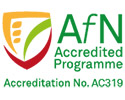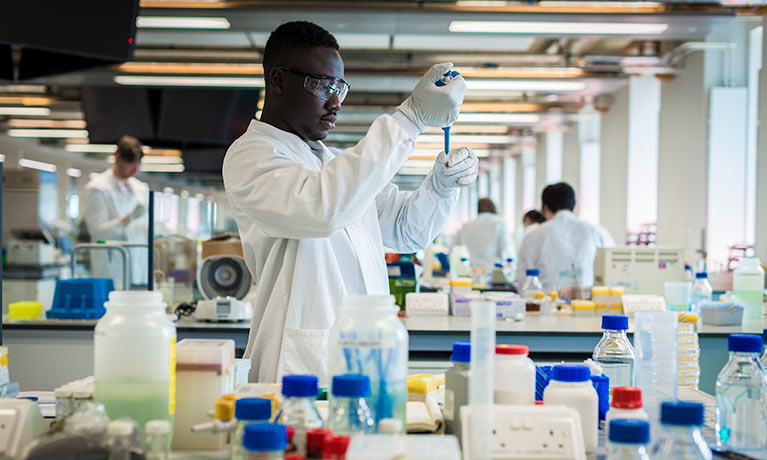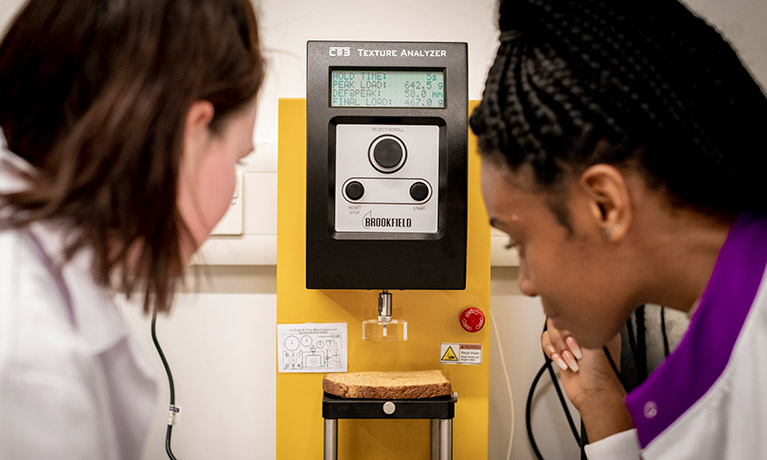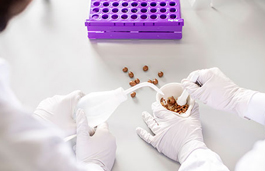Search
Nutrition and Health BSc (Hons)
Study level: Undergraduate
This exciting degree explores the physiological, biochemical and psychosocial aspects of nutrition, as well as public health and health promotion.
Course features
Year of entry
Location
Coventry University (Coventry)
Study mode
Full-time
Sandwich
Duration
3 years full-time
4 years sandwich
Condensed first year available
Course code
B400
Start date
January 2026 - condensed
Course overview
The field of nutrition is growing in importance and graduates from this course will be able to access a wide range of career opportunities.
Nutritionists are needed to work with individuals, groups and communities, the food industry, regulatory bodies and policy makers to promote healthy diets and appropriate food choice.
- The course aims to draw on the expertise of academics from biological and analytical sciences and public health nutrition to provide an integrated course, centred on nutrition and healthy eating, food safety and regulatory processes, food analysis and public health.
- You’ll have the chance to gain hands-on experience of a wide range of scientific techniques. Assessments are designed to mimic real-life scenarios, such as analysing nutrient intake from a food diary, developing dietary interventions and designing health promotion campaigns.
- Throughout the course, you will receive insight from researchers and current practitioners who will bring you the latest issues on a wide range of nutritional and health topics.
The January start for this course is condensed in Year 1. Please see the ‘How you’ll learn’ section below for more details.
Rated Gold Overall
Teaching Excellence Framework (TEF) 20235 QS Stars for Teaching and Facilities
QS Stars University RatingsTop 5 Student City in England (Coventry)
QS Best Student Cities Index 2026Why you should study this course
- No.19 for Food Science in The Complete University Guide 2024.
- Support applying for placements to gain crucial real-world experience2.
- Supported and taught by an academic team which includes registered nutritionists, food scientists, microbiologists, and food safety experts (staff may be subject to change).
- Gain hands-on experience of a wide range of industry techniques in our modern laboratories based in the Alison Gingell Building4.
If you choose to start this course in January you will study exactly the same course but over a slightly shorter timescale in Year 1. This is ideal if you missed the September start, want to transfer from a different university or course or just need a bit more time to prepare for life at university.
Accreditation and professional recognition
The degree is accredited1 and recognised by the following bodies:

Association for Nutrition
Accredited by the Association for Nutrition. On successful completion of the course you are eligible to apply for direct entry to the UKVRN Register as a Registered Associate Nutritionist (ANutr) (additional costs may apply).
The Nutrition and Health course at Coventry University attracted me because of its focus on nutrition while touching on some food science topics that will help me as a nutritionist. My time at Coventry University equipped me with the required knowledge in physiology and biochemistry, nutrition and health, and public health nutrition. Moreover, I learned multiple skills that proved to be beneficial when I started working on my dissertation where I am researching techniques that promote weight loss maintenance.
Alfadhul Almubarak, Nutrition and Health BSc (Hons) current student, 2022

What you'll study
We regularly review our course content, to make it relevant and current for the benefit of our students. For these reasons, course modules may be updated.
How you'll learn
The course utilises a variety of teaching methods, including lectures, seminars, tutorials, group work and practical skills sessions in the maintenance and improvement of food quality and safety, for example, food microbiology laboratory sessions and cooking sessions.
These will be taught in our SuperLab and in the kitchen, where you can work with a range of ingredients and use food processing equipment. We also incorporate the use of specific nutrition-based software, such as Nutritics4.
Formative and summative assessments provide you with feedback to ensure that you are supported in your learning. A blended teaching and learning approach including asynchronous materials, online synchronous and face to face sessions will delivered via the virtual learning environment.
If you choose to start this course in January it will be run as a condensed programme. You’ll start your course in January and finish your first year in August. Upon successful completion of Year 1, you will progress onto Year 2 in September and then continue to start subsequent years of your course in September, completing your degree at the same time as the September starters unless you opt to do a placement year.
Teaching contact hours
As a full-time undergraduate student, you will study modules totalling 120 credits each academic year. A typical 20 credit module requires a total of 200 hours study. This is made up of teaching contact hours, guided and independent study.
Teaching hours:
Teaching hours vary each semester, year of study and due to module selection. During your first year you can expect 15-18 teaching hours each week. You will also have the option to attend optional sessions including time with a progress coach or to meet with staff for advice and feedback. As you progress through your studies, teaching hours may reduce.
Guided and independent study:
Throughout your studies, you will be expected to spend time in guided and independent study to make up the required study hours per module. You'll be digging deeper into topics, review what you've learnt and complete assignments. This can be completed around your personal commitments. As you progress through your studies, you'll spend more time in independent study.
Online learning:
As an innovative university, we use different teaching methods including online tools and emerging technologies. So, some of your teaching hours and assessments may be delivered online.
Assessment
This course will be assessed using a variety of methods which will vary depending upon the module. Assessment methods may include:
- group work
- presentations
- reports
- projects
- coursework
- exams
- individual assignments.
The Coventry University Group assessment strategy ensures that our courses are fairly assessed and allows us to monitor student progression towards achieving the intended learning outcomes.
International experience opportunities
Coventry University is committed to developing global graduates. Throughout the course, we will aim to explore international, national and local food and nutrition practices and policies. This course attracts many international students, providing a diverse learning experience. This aims to enhance the discussion of issues such as globalisation of foods and is designed to provide all students with a global perspective of developments in food, health and nutrition.
The university runs several schemes to allow students periods of overseas study or work experience2. Past students in our department have been successful in securing places to study in Spain, France, Canada and the US.
Please note that all international experience opportunities may be subject to additional costs, competitive application, availability, and meeting applicable visa and travel requirements, and are therefore not guaranteed2.
Staff from different professional backgrounds have integrated research and expertise to provide the students with an ever-engaging teaching and learning experience on product design, nutrition, and public health.
Dr Isabella Nyambayo, Assistant Professor, 2022

I found the curriculum arrangement and teaching resources of Coventry University are excellent. Staff are very responsible and friendly and give me a lot of support. I also like the atmosphere of class, which involves lots of discussion. Overall, the experience of studying this course is amazing.
Nikki Li, Nutrition and Health BSc (Hons) current student, quoted in 2022

Entry requirements
Typical entry requirements:
Fees and funding
| Student | Full-time | Part-time |
|---|---|---|
| UK, Ireland*, Channel Islands or Isle of Man | £9,535 per year | Not available |
| EU | £9,535 per year with EU Support Bursary** £18,300 per year without EU Support Bursary** |
Not available |
| International | £18,300 per year | Not available |
If you choose to study this course with a professional placement2 or study abroad year, you will need to pay a tuition fee3 to cover your academic support throughout your placement year. Students commencing their professional placement in the academic year 2027/28 will pay £1,500 if they are paying UK fees, or £1,800 if they are paying international fees.
For advice and guidance on tuition fees and student loans visit our Undergraduate Finance page and see The University’s Tuition Fee and Refund Terms and Conditions.
The University will charge the tuition fees that are stated in the above table for the first Academic Year of study. The University will review tuition fees each year. For UK (home) students, if Parliament permits an increase in tuition fees, the university may increase fees for each subsequent year of study in line with any such changes. Note that any increase is expected to be in line with inflation.
If you choose to study this course with a professional placement, the University will charge the tuition fees stated above for those on a placement during Academic Year 2027/28. The University will review professional placement tuition fees each year. For UK (home) students, the University may increase fees for each subsequent year of study, but such that it will be no more than 5% above inflation.
For international students, we may increase fees each year, but such increases will be no more than 5% above inflation. If you defer your course start date or have to extend your studies beyond the normal duration of the course (e.g. to repeat a year or resit examinations) the University reserves the right to charge you fees at a higher rate and/or in accordance with any legislative changes during the additional period of study.
We offer a range of International scholarships to students all over the world. For more information, visit our International Scholarships page.
Tuition fees cover the cost of your teaching, assessments, facilities and support services. There may be additional costs not covered by this fee such as accommodation and living costs, recommended reading books, stationery, printing and re-assessments should you need them. Find out what's included in your tuition costs.
The following are additional costs not included in the tuition fees:
- Any optional overseas field trips or visits: £400+ per trip.
- Any costs associated with securing, attending or completing a placement (whether in the UK or abroad).
Condensed course – January start date
If you choose to start this course in January please make sure you check the Fees and Finance page for more information. Although starting this course in January does not prohibit you from being eligible for student finance, the way it is paid in your first year differs from those who start their course in September.
If you start the course in January, your tuition fees will be paid in accordance with the university’s Tuition Fees, Refund and Withdrawal Terms and Conditions for January starters and for any further years of study, your fees will be paid in accordance with the terms for September starters.
*Irish student fees
The rights of Irish residents to study in the UK are preserved under the Common Travel Area arrangement. If you are an Irish student and meet the residency criteria, you can study in England, pay the same level of tuition fees as English students and utilise the Tuition Fee Loan.
**EU Support Bursary
Following the UK's exit from the European Union, we are offering financial support to all eligible EU students who wish to study an undergraduate or a postgraduate degree with us full-time. This bursary will be used to offset the cost of your tuition fees to bring them in line with that of UK students. Students studying a degree with a foundation year with us are not eligible for the bursary.
Facilities
The course is taught at the Coventry University campus, primarily in the Alison Gingell building4.

SuperLab
Our state-of-the-art SuperLab can hold up to 250 students at one time and has facilities for cell culture and equipment for microscopy and growing microorganisms aerobically and anaerobically, DNA, RNA and protein extraction and analysis.

Analytical chemistry suite
You will develop your laboratory skills and will have the opportunity to use analytical techniques for example in the proximate analysis of food e.g. fat or protein content, and using analytical techniques such as UV spectroscopy and chromatography.

Teaching kitchen
You will enhance your cooking skills, design meals to meet different requirements and develop new food or drink products through sessions in our teaching kitchen.
Facilities are subject to availability. Access to some facilities (including some teaching and learning spaces) may vary from those advertised and/or may have reduced availability or restrictions where the university is following public authority guidance, decisions or orders.
Careers and opportunities
You will be taught in a variety of settings, including laboratories and a purpose-built kitchen, so that you have the chance to develop the analytical and practical skills required by employers – working with accuracy and precision to obtain data and results.
Where possible, coursework uses applied tasks that mimic the skills needed in jobs to help ensure you are attractive to potential future employers, such as collection and interpretation of nutritional data to assess nutrient intake from a food diary, or critically appraising evidence to inform the public of current nutrition and health topics. We also offer the opportunity for industry visits and fieldtrips2, which have previously included trips to a local food bank and conferences such as Food Matters Live.
You will also have support with applying for short and long-term placements to gain the experience employers desire. Past students have undertaken one-year placements in the food industry with organisations such as Coventry City Council and Public Health England2.
The careers team can help you find suitable work placements and give you advice on how to get the most out of them.
The need for nutritionists is growing with the increasing incidence of diet-related health conditions such as obesity, heart disease, type 2 diabetes and cancer.
Consequently, graduates from this course should be well equipped for a wide range of roles in the field of nutrition and health – from working on emergency relief projects in low income countries to devising health initiatives to target dietary intakes of specific groups, such as pregnant women, school children and the elderly.
Opportunities may exist within local authorities, charitable organisations, the NHS, parenting organisations, health promotion, and the food and leisure industries. You could also find yourself advising policy makers, regulatory bodies or working in education or the media.
You will be strongly encouraged to take a year out by applying for a work placement or completing a summer internship2.
Where our graduates work
Our graduates have secured roles in companies including:
- The Health Security Agency
- NHS
- Mondelēz International
- PURE International
- Healthy Lifestyles Coventry.
Further study
The course is an excellent foundation for further postgraduate studies leading to an MSc or PhD.
The prospect of becoming a nutritionist has long been a career goal of mine, with a particular interest in the relationship between food, healthy lifestyle, and personal wellbeing. I chose to study Nutrition and Health at Coventry University because the university has the most modern facilities (including high-tech laboratories and experiential learning areas), which help you to excel in your studies. Additionally, the staff and the university offer outstanding support. I have never felt alone! My academic tutors were extremely approachable and keen to engage with their students.
Margherita Porro, Nutrition and Health BSc (Hons) graduate, quoted in 2022


Discover Phoenix+
Phoenix+ brings you together with other students to learn, experience and develop essential knowledge and skills. Whatever destination you choose, it's about preparing you for life after university.
Learn more about Phoenix+How to apply
You may also like






